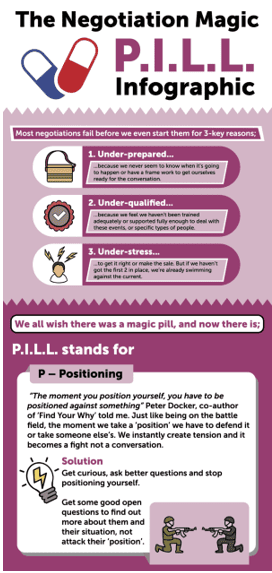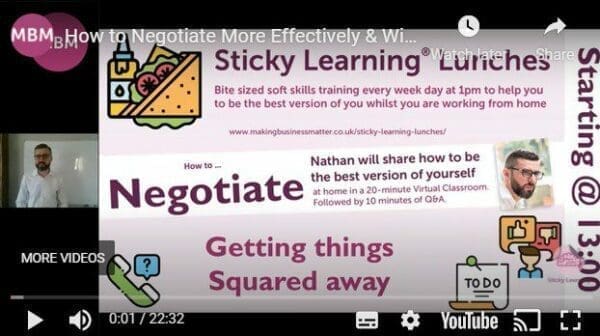At Some Point Every Day We End up in a Negotiation
As I’ve said a million times already in my Leadership career ‘Every day’s a sales day’. Whether that’s convincing yourself to get out of bed to go to work, to pick up the phone to make the next call, or even convincing your partner to go out for dinner. You’re always selling something, and if you’re selling, negotiate follows shortly behind.
On the flip side; if you’re doing it so is someone else. Someone, somewhere in your 24-hours is trying to bargain with us, haggle with us or just trying to squeeze a little extra out of the trade.
The Importance of Keeping a Level Head
Whether this is a salary negotiation with a future boss or getting your 7-year old daughter to bed. Both require the same negotiation skills. Both require a level head, calm approach, and some clear understanding about ‘what’, and more importantly, ‘who’ you bring to the conversation.
Losing your cool with the boss-to-be may result in losing the job before the contract even started. Getting frustrated with your daughter may result in tears before bedtime and a very long and drawn, and often very apologetic lights out.
Honestly though, how much training do we actually have to negotiate? (Especially to deal with 7-year olds) And even if we have had any training, how many hours have we received in relation to the number of years we’ve been doing our job?
Most say ‘zero’ to the first part of the equation, and are left wondering how can I improve my negotiation ability?
If you’re lucky to have had a good manager or director then great. In some cases, you may be even luckier if you’ve had a good buyer that has a little more empathy. Someone who takes you through the learning experience of the back and forth common in trade negotiations.
But for most, nothing, and left wondering what are good negotiation skills? It’s no surprise then that large numbers of our conversation don’t result in what we truly wanted.

Because we feel 3-things:
- Underprepared – because we never seem to know when it’s going to happen or have a framework to get ourselves ready for the conversation.
- Underqualified – because we feel we haven’t been trained adequately of supported fully enough to deal with these events or specific types of people.
- Under stress – to get it right and make the sale or get the right outcome. But if we haven’t got the first 2 places, we’re already swimming against the current.
Let’s apply some tactical empathy here, you’re not the only one. Beating yourself up or giving yourself a hard time about not winning said contract or client happens, especially with little to no negotiation training, isn’t going to help. Honestly, you’ve probably been doing a great job up to now, and hats off to you doing what you’ve done and continue to do with such little input.
The challenge though is with a smidgen of guidance, little training, and only your wins and losses to point you in the right direction sometimes those bad days can seem, well, really bad. Consequently, that has a huge impact on our mindset, how we think, and how we approach the next negotiation we go into.
All of these emotions and experiences give us a need for some sort of magic pill to negotiations.
The Negotiation Magic P.I.L.L.
Delivering our recent Sticky Learning Lunches – The Negotiation Magic P.I.L.L. arrived to help guide the thinking and mindset in order to aid your negotiation preparation and execution.
It all starts inside the mind. When we build and implement some key thinking approaches in our headspace, especially to negotiation it becomes more like a dance than a 5 minute round in the octagon at UFC.
Learn more about how to prepare for a negotiation.
PILL stands for Position, Importance, Listen, and Language one feeding into the next to help you build a better conversation.
Sticky Learning ® is 7 times more effective than 1-day training courses. Plus, you will get a Chain of Evidence proving your Return on Investment. Discover soft skills training that changes behaviours long term.

Free Download
You can take a look at our helpful infographic below. Click on the image for a larger version:

Positioning
Speaking to Peter Docker, Co-Author of Find Your Why, he said to me, ‘The moment you position yourself, you have to be positioned against something‘.
And this is true, whether it’s Quantum, Newtonian or Astrophysics, the moment you position something it requires an opposing force in order to stabilise itself.

It’s also true in a negotiation. The easiest reference is complaint negotiation.
In an experientially guessed statistic, about 98% of people in this sort of situation think there are right, which instantly makes the other wrong. But if the other party believes they’re right and your wrong how well is the conversation going to end?
Every conflict situation occurs because one or both parties believe their needs are not being met. No matter if this is a complaint in a call centre or full-scale war, it’s exactly the same, and just like war, the moment we take a position we have to defend it.
Solution
Get curious and stop positioning yourself. Stephen R Covey suggests:
‘Seek first to understand before making yourself understood’
Get curious about what is happening for the other person. The likelihood is, they probably feel like they need to defend their position and that this conversation is some sort of fight. You have to disarm the situation first and get people to climb out of their mental fox-hole. Create a mentally safe space by asking lots of questions. Find out where they are, what is mutually beneficial, and how you can help them. Because if it’s a win-lose or a lose-lose they’ll be plenty of buyer’s (as well as seller’s) remorse post negotiation and in truth, no one wins.
Action
Make a list of questions you want to ask the other person/people so you can find out more about them and their situation. Make a note of the key (open) questions you want to ask during the conversation. Get them down in bullet points on a note pad, so they’re available on the day when and where you need them.
At the same time get them in some sort of running order, this doesn’t mean they have to go in this order. What it does is give you is a little further structure to the conversation when nerves and tensions can easily escalate. Make it easier for youself.
What did Sun Tzu have to say on this:
‘Every battle is won or lost before it’s ever fought’
Importance
The moment we start raising the importance of something we start adding pressure. Yes, it’s all made up. It only exists in our heads. Nevertheless, there it is, messing up our negotiation, shifting how I feel and the words I use when I’m trying to get the best deal.
And this pressure can come from anywhere, whether it be your boss saying ‘Get this deal or you’ll be fired’, or the make-believe conversation you had with your partner that made you believe they’d think less of you if you didn’t get the promotion. Regardless, we pile it on and wonder why we came across overly aggressive or a simpering fool.
The more important we start to make it the bigger the problems we have, and this will come out in 2 ways:
Needy & Greedy.
Neither of which is a particularly good look and very rarely gets you the desired outcome of any conversation.
Solution
Take the importance out, learn to have fun and you’ll be more natural. Whether you’re going for the job interview or client pitch it doesn’t matter. We never had it in the first place, and you can’t lose something you never had.
With this in mind, you can start to disassociate from the perceived win or loss. Even if you don’t get the job, what do you get? Feedback, insight and more practice.
For every contract we don’t seal, we learn about the market place, we learn about a sector or industry.
There is always a take away whether this is about you, them or both.
Action
Take time to build your own feedback loop, with yourself or where possible with the other party. Try to find the 1% or even 10% improvement along the way.
Sun Tzu reminds us about knowing ourselves:
‘If you know the enemy and know yourself, you need not fear the result of a hundred battles. If you know yourself but not the enemy, for every victory gained you will also suffer a defeat. If you know neither the enemy nor yourself, you will succumb in every battle.’
Listening
Leading beautifully into learning to use your ears and eyes more as we enter the conversation. If we’ve already positioned ourselves, have entered the conversation as the ravenous hungry shark how likely are we to be paying any attention to other people?
Zero. Why? Because when a shark actually strikes it rolls its eye back in its head so it’s not even seeing what is going on around it.
When we listen, it is with our eyes and our ears. We see how people are sitting, how they shape their words, picking up what is important to them. Paying attention to all these details. Because in this you’ll see how they’re positioning themselves giving you the opportunity to disarm and coax them out. You’ll hear what is important to them and where their perceived pressures are coming from. Maybe their boss has threatened them to get a better deal.

When we start to pay attention, we get more on the table and the more there is on the table the more there is to work with.
Solution
Get the first 2 elements in place. Remember how many eyes and ears you have in relation to the quantity of mouth you have. 80/20.
Actions
Make sure you’re paying attention. Yes, you’ve got your questions ready to ask, while you’re listening, take notes.
Please make sure it’s the right quantity of notes. Too few and you’ll be struggling for meanings when you need them or have issues building the post conversation confirmation email. Too many and you’ll lose their engagement in the moment.
Look for the cues of what is important, and document the Key Points of Importance (a Negotiation KPI). In the middle of the negotiation, you may still be under pressure. Consequently, as a result, your brain may not be working on all cylinders. Doing this will help get prompts in front of you when you need them most.
Get more strategic.
One of my favourite Sun Tzu quotes is very relevant here:
‘Strategy without tactics is the slowest route to victory. Tactics without strategy is the noise before defeat.’
Language
Once we’ve released our positioning, lowered the importance, and started listening, this enables us to shape our language and affect the words we use and the way we enter into and interact in our conversation.
When we stop trying to defeat the adversary in this way, we can then make better use of the key words picked up and create the win-win-win rather than anyone losing out and any sort of post-deal regret.
Solution
Find the most important things to your person as possible. Take notes if you need to, bullet point what you hear so you build a stronger insight into them; as a person, as a buyer and as a business. When you’ve extracted these nuggets. Find appreciation in their point of view, rather than trying to dismantle the argument or debate. Actually show appreciation and find value in what they’ve shared.
By doing this, it reduces tension and disarms the potential conflict. Why? Because people don’t expect you to see any good in what they’re bringing to the table.
Action
Referring back to your notes, or acknowledging what the KPI’s are to them, and then say ‘I really appreciate you sharing those details, thank you very much.’
From here we have to show we were listening, ‘What I heard was this, this and this and can see how that is important you because of XYZ’.
We’ve shown appreciation, found value in their world and showed we were listening.
We can then add, ‘How this solution could help in this situation is…’ We simply build up rather than breaking down.
In truth, as Sun Tzu:
‘The supreme art of war is to subdue the enemy without fighting.’
Therefore, there is no war.
Which is why I’m using his quotes here. If we keep thinking it’s a war or a battle it always will be. First subdue the inner-enemy, the voice of the critic that adds the pressure, or supports the perceived lack of qualification.
‘When there is no enemy within, the enemy outside can do you no harm’ – African Proverb
If we look to support, ally and build-up we’ll get a much better outcome for every conversation and relationship. Because that’s what business is built on – better relationships.
Watch the Video to Learn More:





